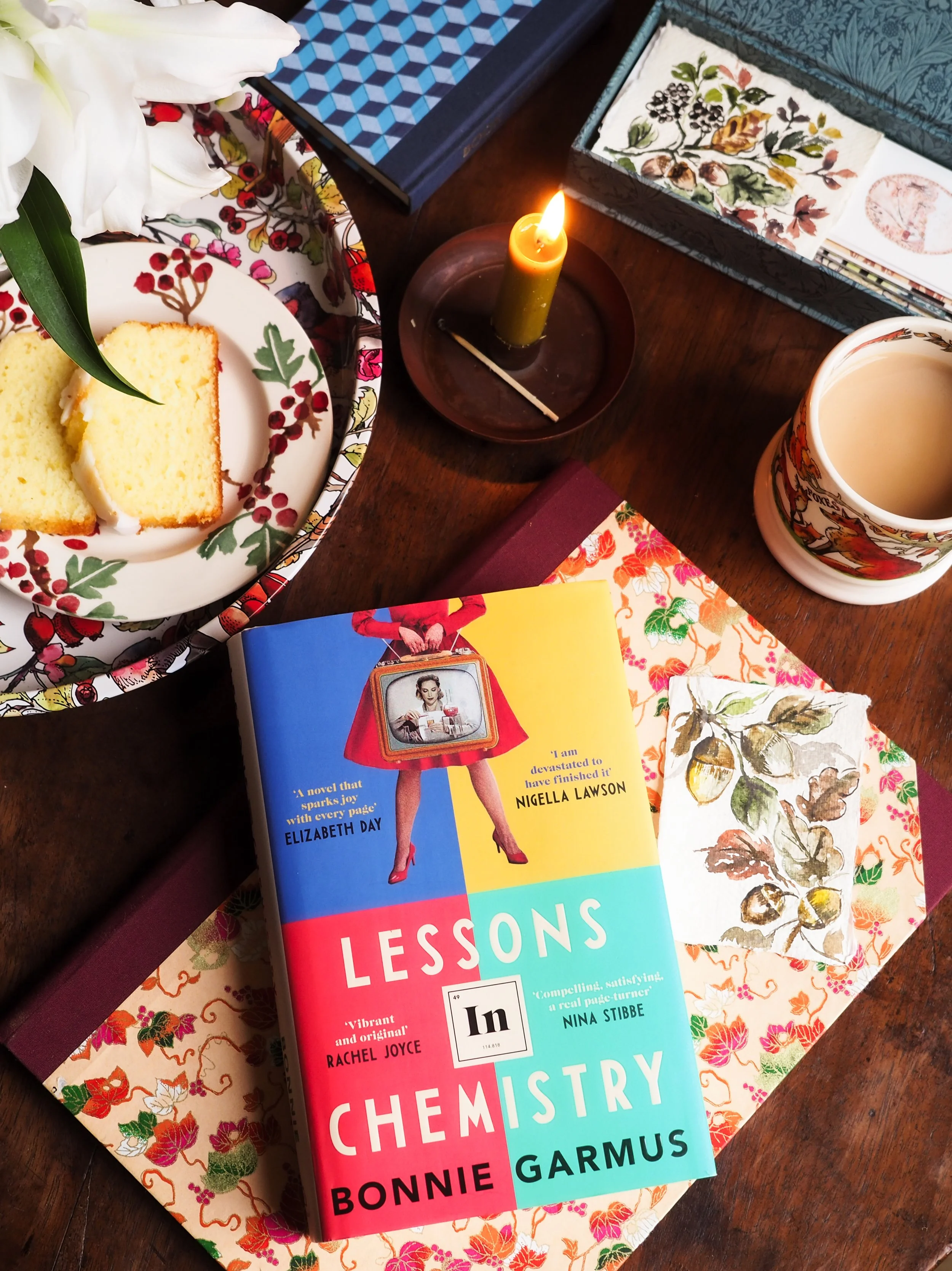Lessons in Chemistry by Bonnie Garmus
Lessons in Chemistry* by Bonnie Garmus is an unlikely blend of fairytale meets feminist manifesto. I don’t think I’ve ever read a book that brings so many seemingly disparate themes (grief, rowing, women in science, cooking, agnosticism, motherhood, dogs) into one volume, but for the most part, it works.
Elizabeth Zott is a young, brilliant female research chemist struggling to be taken seriously in the male-dominated world of Hastings Research Institute in 1952. Despite the fact that her brain moves light years ahead of her male colleagues, Elizabeth is continually side-lined, belittled and exploited. Coping with the daily sexual harassment and discrimination typical of mid-century USA, Elizabeth is uninterested in pursuing any romantic attachments until one day she encounters Calvin Evans, a Nobel-Prize nominated scientist who sees Elizabeth for the extraordinary person she is.
Their connection is true chemistry, but a terrible accident breaks Calvin and Elizabeth’s incredible bond, and Elizabeth finds herself grappling with life as a single mother. Another chance encounter leads her to accept a job as the host of a new TV cooking show, Supper at Six. Elizabeth’s scientific approach to cooking, explaining the chemistry intrinsic to each ingredient and dish, partnered with her unwavering belief that women’s work - both within and outside of the home - is important, proves a smash hit across America, and Elizabeth finds herself catapulted to fame.
But as Elizabeth inspires other women to change their lives (‘Courage is the root of change,’ she says, ‘and change is what we’re chemically designed to do.’), she realises how much she needs to change her own. First and foremost, Elizabeth Zott is a chemist, and her determination to carve out a place for herself in the world of science is one of the most inspiring aspects of the book.
The biggest strengths of Lessons in Chemistry are its unforgettable heroine and its brilliant example of female ambition succeeding against the odds. The book challenges all women to aim higher and demand more, in a message that reaches across decades, just as relevant now as in its mid-century setting: ‘...when you wake up tomorrow, make this pledge. No more holding yourself back. No more subscribing to others’ opinions of what you can and cannot achieve. And no more allowing anyone to pigeonhole you into useless categories of sex, race, economic status, and religion. Design your own future. When you go home today, ask yourself what you will change. And then get started.’
Strong as it is, Lessons in Chemistry occasionally stumbles, reminding the reader that this is a debut novel. I found some of the plot twists a shade too implausible; I often laugh about the improbable amount of death and disaster in Victorian melodramas, for instance, and Lessons in Chemistry is as unbelievable. There is a definite fairytale quality to this story, with its ‘fairy godmother,’ who is able to tie things up so nicely in the finishing pages. There’s also a dog with such a degree of human-level understanding and intelligence that he’s practically a speaking character. These elements of the book skirt the realms of magic realism and sit rather oddly alongside its no-nonsense, severely practical and scientifically minded main character.
Rather than strengthening the novel’s central theme of female empowerment, I find the fairytale-quality undermines it; real women, after all, don’t live in fairytales. Their dogs probably won’t act like competent Nannies and pick their four-year-old children up from school when they’re busy at work. I am not a mother, but I would imagine any single mothers reading this book (assuming they’ve found time to sit still for more than two minutes) would laugh mirthlessly at Elizabeth’s experience of having a neighbour ready and willing to babysit at 4.30am everyday so Elizabeth can go rowing, nevermind all the stuff with the dog.
Despite these weaknesses, there is so much to admire when reading Lessons in Chemistry. Bonnie Garmus writes about grief, another central theme in the book, with huge compassion and understanding. I was fascinated by her descriptions of rowing (Garmus is clearly a keen rower herself), and how having a physical outlet that also involves working as part of a team helps Elizabeth in dealing with her grief and trauma. Elizabeth’s refusal to accept limitations - either for herself or others - is universally inspiring, and one of my favourite aspects of the book is how it illustrates that change may start by taking the simplest of small steps, even if that step looks like cooking a nourishing, satisfying meal.
Female solidarity eventually wins the day in this novel, so that the book concludes on an uplifting and hopeful note. Lessons in Chemistry breaks your heart at the start, but by the end leaves you cheering on its exceptional heroine and her chosen family, as well as asking yourself the book’s vital question: what will you change?
*Please note: affiliate links are used for Blackwells. If you order a book from Blackwells using one of my affiliate links, I may make a small commission from your purchase, at no additional cost to yourself. I like to support Blackwells by linking to their website, as I’m a big fan of their flagship Oxford bookshop, and they offer reasonable overseas shipping. You in turn support my work by shopping through my affiliate link. Thank you!



